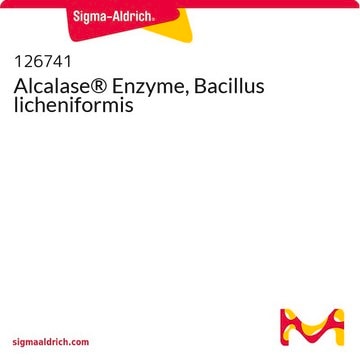V2010
Viscozyme® L
cellulolytic enzyme mixture
Sinónimos:
Cell Wall Degrading Enzyme Complex from Aspergillus sp., Lysing Enzyme from Aspergillus sp.
About This Item
Productos recomendados
biological source
fermentation/recombinant
Quality Level
form
liquid
enzyme activity
≥100 FBGU/g
technique(s)
protein extraction: suitable
density
~1.2 g/mL at 25 °C (lit.)
suitability
suitable for cell lysis
application(s)
cell analysis
storage temp.
2-8°C
General description
Application
- in the extraction of polyphenol from grapefruit and unripe apples.
- to study the effect of its supplementation on nutritive value and silage characteristics of sunflower silage.
- for simulation of the fermentation process during in vitro digestibility of former food products (FFPs).
- for enzymatic treatment, to study its effects on the antioxidant properties of wheat bran.
Biochem/physiol Actions
Features and Benefits
- Not a GMO and doesn′t contain GMOs.
- Made by fermentation of a microorganism.
- Improves process through faster, more efficient oil/water separation.
Legal Information
signalword
Danger
hcodes
pcodes
Hazard Classifications
Resp. Sens. 1
Storage Class
10 - Combustible liquids
wgk_germany
WGK 1
flash_point_f
Not applicable
flash_point_c
Not applicable
ppe
Eyeshields, Gloves, multi-purpose combination respirator cartridge (US)
Certificados de análisis (COA)
Busque Certificados de análisis (COA) introduciendo el número de lote del producto. Los números de lote se encuentran en la etiqueta del producto después de las palabras «Lot» o «Batch»
¿Ya tiene este producto?
Encuentre la documentación para los productos que ha comprado recientemente en la Biblioteca de documentos.
Los clientes también vieron
Nuestro equipo de científicos tiene experiencia en todas las áreas de investigación: Ciencias de la vida, Ciencia de los materiales, Síntesis química, Cromatografía, Analítica y muchas otras.
Póngase en contacto con el Servicio técnico









